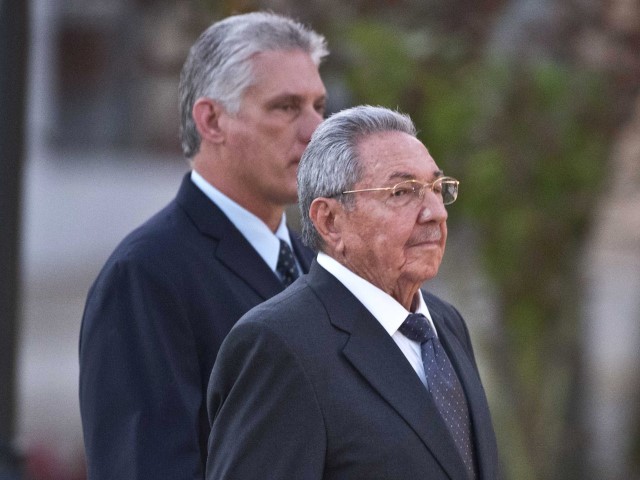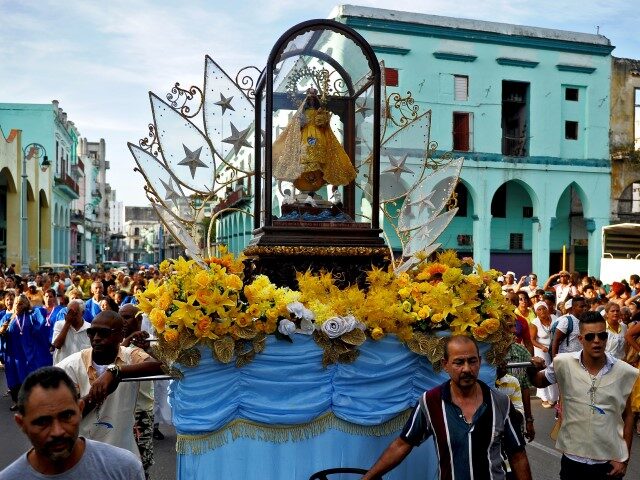The communist Castro regime in Cuba has forbidden the local Catholic Church in the town of Esmeralda from celebrating a traditional evening procession of Our Lady of Charity of El Cobre, Father Alberto Reyes Pías announced over the weekend.
The Castro regime has forced the local community to celebrate the procession at an earlier hour instead, when the sun and heat conditions are “overwhelming,” according to the Catholic priest.
The Vatican declared Our Lady of Charity of El Cobre as Patroness of Cuba in 1916. Cuban Catholics mark September 8 as the feast day of the Blessed Virgin Mary.
The traditional procession is part of the yearly celebration of Cuba’s patron saint, which includes a solemn Mass followed by a series of processions with the image of the Virgin across several towns in the nation, which the faithful accompany with prayers.
On his Facebook account, Priest Pías said on Friday that the local parish in Esmeralda was scheduled to celebrate an evening Mass and then carry out the procession, as per tradition – but the Castro regime imposed a restriction that the procession cannot take place at night, with “no explanation, no appeal possible.”
“The [Cuban Communist] Party has spoken, the Party has decided, and its decision admits no reply, either it is accepted or there is no procession, even at an hour when the sun and the heat are oppressive,” Pías wrote.
Pías, a staunch critic of the Castro regime’s communist indoctrination of children in schools, lambasted the regime for the lack of respect for religious freedom in Cuba and its continued control of any activity deemed “suspicious.”

Cuba’s Raul Castro, center, and Miguel Diaz-Canel in Cuba, Sunday, Jan. 28, 2018. (Ramon Espinosa/AP)
“Then the authorities complain to the bishop when we say loudly that this is called dictatorship, that we are a people bound and gagged,” Pías said.
Cubans have been protesting on a daily basis for the past years, demanding an end to the Castro regime after more than six decades of communist rule, which has left Cubans living under extreme and inhumane conditions that include constant blackouts, shortages of basic supplies, and lack of access to health care.
Some of the protests against the communist regime, such as those that are organized to protest against frequently occurring lengthy blackouts, take place at night.
Last year, nearly 4,000 protests against the Castro regime were registered to have taken place in Cuba, of which 584 were registered in December 2022 – a number that surpassed the protests registered during July 2021, when a historic wave of protests against the Castro regime took place.
“Then the repressive organs are alarmed when here and there the people explode and shout “Fatherland and Life,” “freedom,” and “change of system,” Pías said. “If as a Church we cannot even decide the time of a procession, what can these people expect?”
“And while the authorities of this country monitor to the millimeter the activities that may be suspicious to them, and prepare the deployment of the agents that will meticulously “take care” of every step of every procession, hunger grows, medicines are lacking, fuel is reduced, people’s lives are sinking,” he continued.
“But that is not important, what is important is to respond to those who have clung to power and seem determined not to let go of it even if these people fall to pieces,” he said.
Pías explained through his Facebook account that the Esmeralda parish will carry on with the Catholic procession “under the sun, crushed by the head, our clothes stuck together by sweat.”
“We will walk as a believing people next to the image of the Virgin, like the children of Israel in the desert, praying that one day the promised land will come,” he vowed. “And we will pray for the needs of the children of these people, asking God for the strength for our struggles, the necessary prosperity, and the freedom that does not come.”
The priest concluded by stating that they will pray for those that govern Cubans, for those “who have understood power as dominion and not as service, as control of masters and not as collaboration among brothers.”
“We will pray for them and for all those who allow them to keep the ropes stretched, although they suffer the same hardships, and live the same fears,” he said.
“We will pray for them to remind them of what they already know, that when all this ends – and it is certain that it will end – this Church that they persecute today will perhaps be the only one that will protect them from violence and revenge, the only one that will treat them as the human beings they are, the only one that will look upon them with mercy,” he promised.

COMMENTS
Please let us know if you're having issues with commenting.